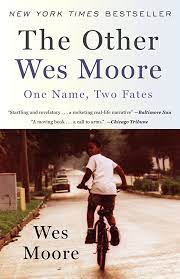The Other Wes Moore: One Name, Two Fates Shows the Impact of School on Success

A picture of the cover of the book The Other Wes Moore by Wes Moore
May 19, 2023
The Other Wes Moore: One Name, Two Fates by Wes Moore is an autobiographical and biographical non-fiction story about the lives of two men, both named Wes Moore. The author became a successful banker and politician, and now the Governor of Maryland. The other Wes Moore is spending life in prison for his involvement in a robbery that left a security guard dead.
The two shared many commonalities outside of just their names, they both began life in Baltimore, living in the same neighborhood for a while, and both grew up almost completely without a father. The novel follows the lives of both young men, showing both how their lives were similar, but also how they drifted apart.
How does the message and story change as we think of Wes Moore as the Governor of Maryland? He gained much of his recognition from this novel, and it could be considered part of the reason he was able to become Governor.
Moore’s ultimate conclusion boils down to the idea that either of their stories could have been each others, leaving a cautionary tale about how small instances can effect young men. However, this is a bit of a stretch of a conclusion to be made. Moore attributes his success and freedom to having positive role models. Moore spent a bit of his early life in West Baltimore, but lived for a while in the Bronx, an idea that Moore seemingly glosses over in the novel.
The Bronx is very different from West Baltimore, and when it is taken into consideration that Moore went to a rather prestigious private school before switching to military school, it shows that the lives of the two of them were not as similar as he claimed. Education has a significant impact on the lives and outcomes of people, to dismiss the large difference in education received between the two is irrational.
The other Moore did not complete High School, although he did end up earning his GED after a few years. Governor Moore’s habit of skipping classes and rambunctiousness were less of a detriment to his education as the other Moore’s dropping directly out of High School. When he tried to get a legitimate job and provide for his family, his lack of a diploma as well as his criminal record made it difficult when not impossible to find a good job. Moore was able to succeed during his time in military school, and later ended up with prestigious opportunities.
The difference between their lives should not just be a story that shows the role that luck or chance plays in the lives of young men, but also to show how far good schooling goes in their lives. These were not mere coincidences as it may be put by Moore to some degree, but a tragedy that reveals how detrimental underdeveloped school systems can be to the youth of America, without excusing the actions taken by Wes Moore in 2000.